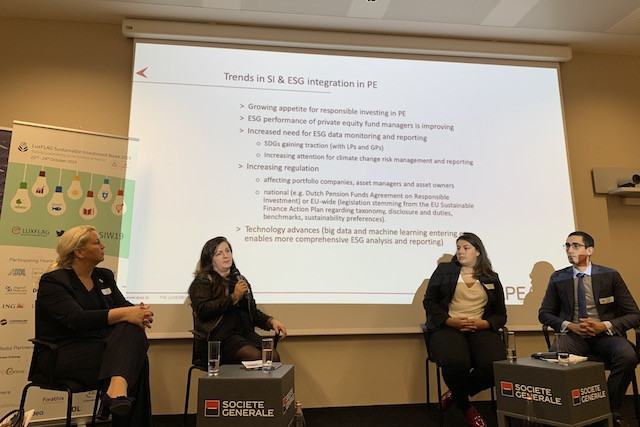The comments were made during a panel talk entitled “Trends in ESG integration in private equity”, which was one of 15 events held during “Luxflag Sustainable Investment Week 2019”.
The conference was organised by Luxflag, a not-profit outfit that checks fund managers’ responsible investment claims. Sachin Vankalas, its general manager, said Luxflag issued labels for funds with €65bn in assets under management, including those in Ucits and private equity funds.
Numbers game
When selling sustainable funds to institutional investors, “talk their language”, said Antje Biber, board president of the Swiss part of Feri, an investment advisory for family offices and institutional investors.
That includes risks (“first and foremost”), regulatory framework (insurers and pensions funds face strict rules), economic arguments, and the investment opportunities and performance. “You don’t see the word ‘sustainability’ on the list” because institutional investors are “not primarily interested” in green goals, aside from Dutch pension funds, which face strong regulatory requirements, stated Biber.
“The responsibility of pension funds is not to save little polar bears. It is to pay our pensions,” she later said. Ultimately more regulation will be needed to move the market, in other words.
That is beginning to happen. The German regulator Bafin recently published a paper calling on money managers to include environmental risk in their funds’ risk profiles. That is a “major change”, said Biber.
Dutch pension funds only have those strict requirements because they have faced extensive media coverage and public scrutiny of their portfolios starting in 2007, explained Silva Deželan, sustainability director at Robeco Private Equity, the PE arm of the large Dutch asset manager. While risk management and investor pressure are important drivers, “corporate values” are playing an increasingly important role, she argued. ESG standards are slowly becoming not just the “right thing to do, but good business or the only way to do business in Europe”.
Sometimes responsible investments do not have to be overly complex, reckoned Malvina Pau, ESG manager at Amethis, a French asset manager focused on long-term investments in Africa. For example, Amethis invested in a bottled natural gas company in Burkina Faso. Since the gas is replacing charcoal for home cooking, which creates both health and environmental problems, this simple act of financing a company with a straightforward business model has “a big impact” without compromising any future financial returns.
Labels
As the conference was organised by an outfit that issues fund labels, the question came up of whether or not certification is useful in the private equity space, with its supposedly savvier set of investors.
Deželan said that, in formal terms, “we are not using labels in our selection process” but it is a useful signal about a manager’s strategy, policy and awareness. “Labels are one of many things we look at.” She said “labels do play a role” in the marketplace. The external checks provide “at least some assurance that somebody has looked at” fund claims. Although there are “a lot of labels” out there, possibly leading to some confusion.
Only sophisticated investors and bigger investors with plenty of resources can truly tell if “impact investments” really make an “impact” themselves, observed the panel moderator, Aurélien Roelens, investment director and ESG coordinator at Cube Infrastructure Managers, a Luxembourg fund manager.
Which indicators are really key?
Across her firm’s PE portfolio “there is no ESG reporting… because investors have not asked for it,” said Biber. “If investors do not demand reporting and key performance indicators, it won’t happen.”
Investors will need those metrics, of course, but Pau encouraged those in the fund industry to ask about the utility of key performance indicators and filter out numbers that just produce unnecessary noise. A useful KPI can help you “take a strategic decision”, she said. If a KPI does not aid in strategic decision making, then you “probably don’t need to measure it.”
For their parting comments, Pau told conference attendees they should always consider, “where my responsibility lies, period.”
Don’t get scared by the sea of standards and terminology, said Deželan, “just start doing something”.
Show how ESG investments can address “extra financial risks out there that might transform the industry you’re investing in,” advised Biber. “Long term investors want to see you’re aware of long term risks and long term opportunities.”
